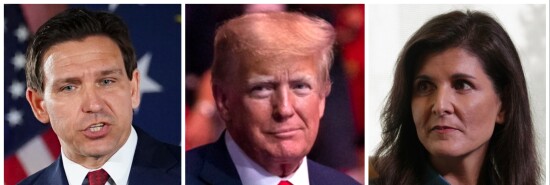
The rapidly shrinking GOP field
Byron York
THE RAPIDLY SHRINKING GOP FIELD. The announcement from Sen. Tim Scott (R-SC) that he is dropping out of the 2024 Republican presidential race fits the definition of the phrase “shocking but not surprising.” Yes, it was jarring that Scott did it when he did, with no advance notice, during a Fox News appearance with his good friend Trey Gowdy. But Scott’s departure was no surprise. He was well liked, highly thought of, and going nowhere in the Republican race. His campaign lasted from his announcement on May 22 to his departure on Nov. 12.
Of course, Scott faced obstacles, one of which was the presence of former President Donald Trump — an obstacle shared with every other Republican running this year. But Scott’s biggest obstacle was his own campaign. More than any other GOP candidate chasing Trump, Scott ran on his own background and temperament. It wasn’t enough to convince Republicans that he could win and lead the country.
This is from this newsletter, reporting from Iowa in June: “Scott is convinced that his life story — black man in South Carolina with unpromising beginning rises to United States senator — combined with a solid conservative voting record will appeal to Republican voters, in Iowa and beyond.” And more:
Subscribe today to the Washington Examiner magazine that will keep you up to date with what’s going on in Washington. SUBSCRIBE NOW: Just $1.00 an issue!
The case Scott makes to voters has two main parts. The first is that his biography proves that what leftists say about America is wrong. Don’t believe it when you hear the U.S. is a racist country, Scott says. He begins by making clear: He is a black man whose black family came from South Carolina and lived through racism and Jim Crow and the entire African American experience. But that is not how America is today, Scott continues. His grandfather, born in 1921, left school in third grade, began picking cotton, but lived to see his grandson win a seat in Congress.
“He lived long enough to see America evolve,” Scott said. The critics on the Left “refuse to accept the progress of America, that who we were then is not who we are now. They want us, as the American people, to believe that somehow we are an evil and declining nation. That is a lie. We are the land of opportunity, not the land of oppression.”
The second part of Scott’s appeal is his promise to return to optimism and hope in campaigning and governing. It’s an openly Reaganesque appeal, although one would have to be at least 50 years old to remember Ronald Reagan saying things like that. Scott’s message is: With me, you can get the same conservative policies that you got with Trump, only with a Reagan-like optimism and hope.
Later, I asked Scott about his “same conservative policies” argument. Did he have some substantive policy differences with Trump or his fellow candidates? What set him apart? Scott said that most everybody in the race believed the same things — lower taxes, strong defense, etc. — so what really mattered, the distinguishing factor between them, was the character of each candidate. That’s where his life story came in.
It was an interesting idea, but it didn’t work. Scott impressed voters in small encounters, which is a good ability to have in Iowa, where he made his best impression. But when the GOP debates began, his biography-over-policy approach did not win him new admirers. Scott basically disappeared from the first debate and did little better in the next two. It turned out that for many Republicans, policy did matter more than biography. The simplest way to describe the Scott campaign in September and October is that the candidate just didn’t catch on.
In his talk with Gowdy, Scott left open the possibility of running again. After all, in a post-Trump world, who knows what might happen? People will probably still like Scott, so things might be different. But for now, the Scott campaign joins the many, many abandoned campaigns of primary seasons past.
Now the campaign goes on, with the smaller field much desired by Republicans trying to stop Trump. The first Republican presidential debate, held Aug. 23 in Milwaukee, featured eight candidates: Scott, Ron DeSantis, Nikki Haley, Vivek Ramaswamy, Mike Pence, Chris Christie, Asa Hutchinson, and Doug Burgum. The second debate, held Sept. 27 at the Ronald Reagan Presidential Library and Museum in California, had seven candidates — the original field minus Hutchinson. The third debate, held Nov. 8 in Miami, had five candidates — the original field minus Hutchinson, Burgum, and Pence. Pence dropped out on Oct. 28.
The next debate, scheduled for Dec. 6 in Tuscaloosa, Alabama, might have just three candidates — DeSantis, Haley, and Ramaswamy. The narrowing wished for by Republicans who hope to defeat the prohibitive front-runner and debate-skipper Trump — it’s happening. Whether it will make any substantial difference in the dynamics of the race — Trump far ahead, everybody else far behind — is another question.
For a deeper dive into many of the topics covered in the Daily Memo, please listen to my podcast, The Byron York Show — available on Radio America and the Ricochet Audio Network and everywhere else podcasts can be found.
